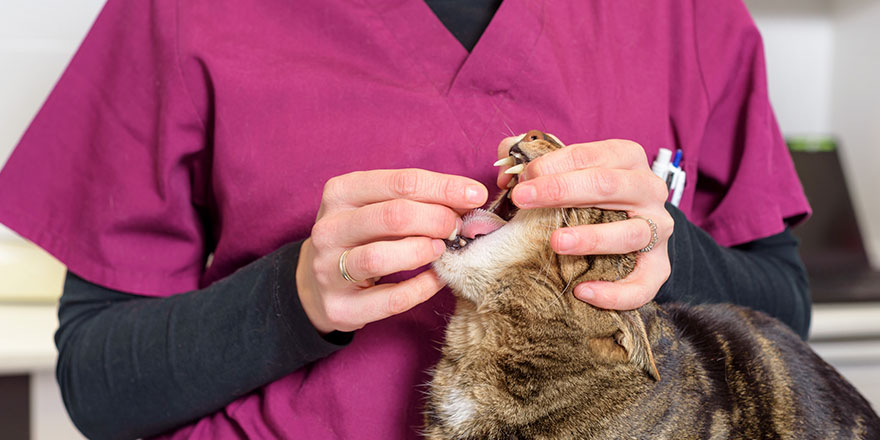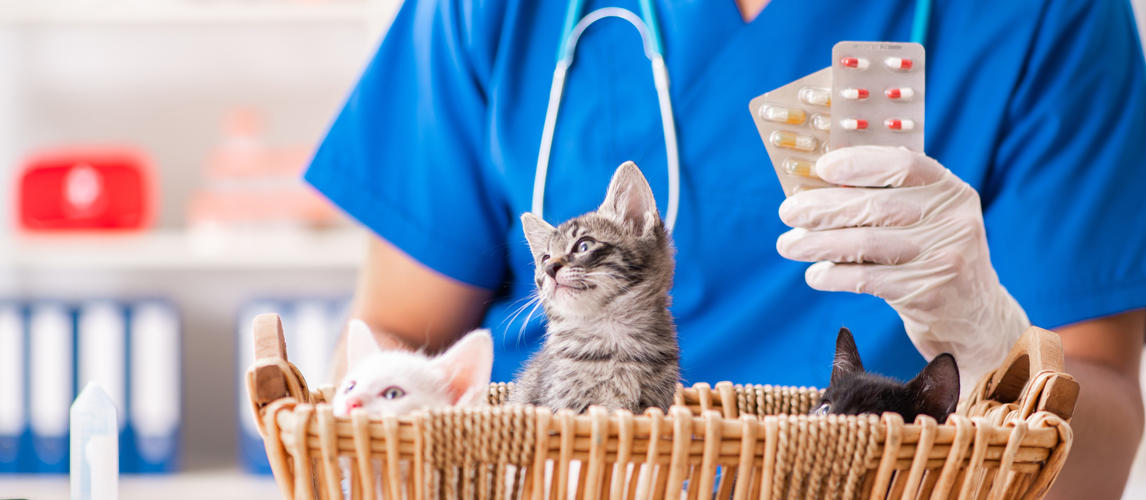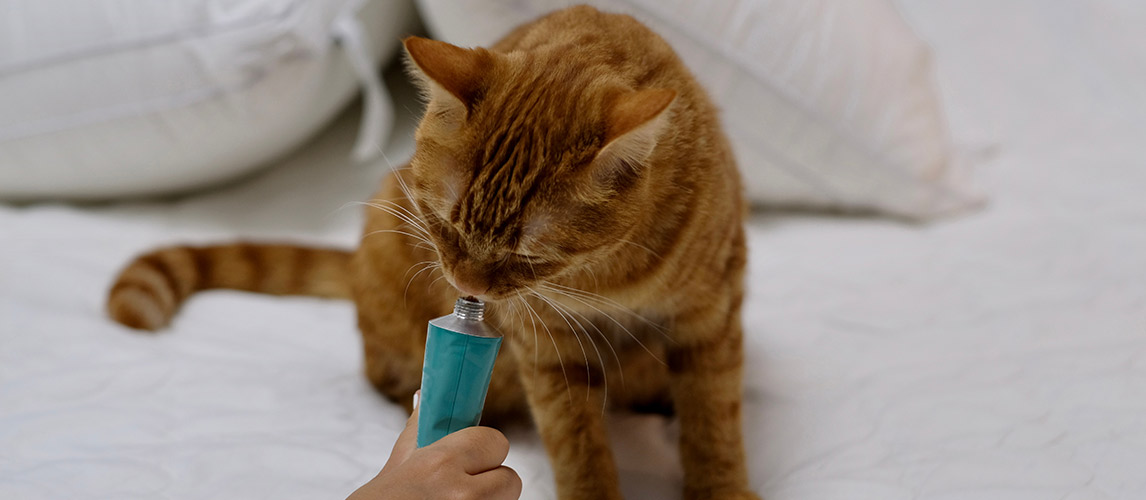As a cat owner, there are some essential care routines that you should never neglect. And top of the list is a regular worming program. There are four main types of worms that can infect cats and left unchecked can make your pet unwell. So, as well as taking preventative measures against intestinal parasites, deworming your cat is a must.
We look at how to deworm a cat and why it is so important.
How Cats Can Pick Up Worms

There are numerous factors at play when it comes to your cat picking up intestinal parasites, and they can vary from pet to pet. Their lifestyle, whether they are indoor or outdoor cats if they tend to frequently prey on animals such as rats or small rodents, and whether you live urban or rural all contribute. The local climate and outdoor temperature can also raise the risk of worm infection in your feline friend.
- Some of the most likely ways for your average cat to contract worms include:
- A kitten drinking infected milk from its mother
- Contact with or ingestion of contaminated soil, dirt, animal vomit, or infected feces
- Killing or consuming wild prey such as birds, rats, or mice
- Flea, mosquito, or tick bites
- Coming into close contact with another cat (or animal) that has worms
By the nature of their lifestyle, outdoor cats, or adult cats who are allowed outside to roam are more likely to pick up worms, although it is possible for indoor cats to experience intestinal worms too.
Types of Worms in Cats

Roundworms
The most common type of worm found in cats, roundworms is transmitted when your kit ingests eggs or larvae, often via contaminated soil, animal feces, or the muscle tissue of infected rodents. Roundworms are also common in kittens as they can pick up the parasites via their mother’s milk.
With two types – Toxocara cati and Toxascaris leonine (which is passed from mother to kitten) – adult roundworms can grow to five inches long and have the look of wet spaghetti or thin noodles. They like to settle in your cat’s intestines where they can then deposit their roundworm eggs into your pet’s stools.
Roundworms are treated with medications that sedate the parasites so they can be easily and safely passed out via your cat’s feces. The eggs of the roundworm are, however, extremely resilient, and so a regular worming program is recommended to keep your kit roundworm free.
Tapeworms
The eggs of the most common tapeworms – Dipylidium caninum – are attached to flea larvae and can be ingested by a cat when they are grooming. Tapeworms are typically found in adult cats although kittens with fleas can also be susceptible. Outdoor cats are particularly prone to contracting tapeworms, including Aenia taeniaeformis, which is found in rodents.
With their long, flat bodies, tapeworms can grow up to eight inches long and attach themselves to the small intestine wall via their hook-like mouth. Tapeworms feed off partially digested food in a cat’s gut and can deprive your pet of much-needed nutrients if allowed to take hold.
Cat owners will often see tapeworm segments resembling rice grains or sesame seeds near to their cat’s back end or in their bedding. Oral or injectable medications are typically prescribed to treat tapeworms in cats.
Hookworms
The smallest cat worm variety, hookworms live in the soil so can be picked up by your pet if they groom their paws after walking over an infected area. They can also pick up hookworm by eating the feces of infected dogs or cats or transferring the parasite to their litter box.
Around one inch in length, the hookworm settles in the small intestine where they like to feed off blood. Left untreated, this can lead to anemia in your cat, which can be life-threatening, especially if they are very young, old, or frail.
Whipworms
These quarter-inch parasites settle in a cat’s colon and can cause severe organ damage if left untreated. Whipworms can be found in a contaminated environment such as soil, dirt, or water as well as the bodies of rodents, and are picked up by ingestion. Diarrhea, bloody stools, weight loss, and anemia are the main symptoms of whipworm infection. Whipworms are mostly found in moist areas and climates.
Heartworms
Unlike intestinal worms, heartworms affect the heart and the pulmonary arteries of a cat’s circulatory system. These minute worms are transmitted to animals via infected mosquitos and migrate around the body enroute to the heart. They cannot be transferred from animal to animal and are more common in dogs than cats. However, heartworms can prove to be fatal if not diagnosed in time.
There is currently no drug approved to treat heartworm disease in infected cats and the treatment involves stopping the progression of the infestation and managing the symptoms. Respiratory failure because of a reaction to heartworm toxins and even death are complications of these worms and so prevention is the best option for your cat.
Symptoms to Look Out for

One of the first obvious signs of worms in your cat is when you see signs of intestinal parasites in your pet’s poop or in their bedding. So, if you do suspect your cat has worms, then a trip to the vet for fecal tests is the best way to confirm a diagnosis and get prompt treatment.
Other physical signs of intestinal worms to look out for include:
- Cat diarrhea
- Scooting their bottom on the ground
- Vomiting
- Weight loss
- Bloating/pot belly
- Increased appetite
- Poor fur condition
- Lethargy and listlessness
- Skin irritation
- A chronic cough
Whatever the signs or symptoms, if you do suspect your cat has worms, then a trip to the vet for a fecal test or fecal exam is the best way to confirm a diagnosis and get prompt treatment, including a cat deworming program.
The Importance of Regular Worming
Even though the thought of their cat having worms is pretty gross for all pet owners, it can be much more serious than finding evidence of worms in their poop or bed. Left untreated, parasitic infestations can wreak havoc on a cat’s health, especially if they are very young, a senior cat, or has other health issues such as a compromised immune system. And in the worst cases, a worm burden in a cat can prove fatal.
From anemia, dehydration, and diarrhea to a potential intestinal blockage, having worms is no fun for your cat either and they will not feel in their best health. So, ensuring your kit has a vet-prescribed cat deworming program is essential.
Check out our article on: Cat Eating Litter – Causes & Solution
How to Deworm a Cat

The first step in deworming a cat is to take your pet to the vet for an accurate diagnosis. They will then be able to put together an appropriate treatment plan, designed to treat worms your pet may have and then prevent any others from returning.
Dewormers for cats are available as oral medications or in liquid form. They can also be a topical medication, depending on your pet, their lifestyle, and intestinal parasite risk.
Oral medications – these can be either tablet or liquid forms and are often combined with medications to prevent other parasites and protect against fleas and ticks. Oral deworming treatments are quick and easy to use and can be added to your cat’s meals or as a tasty cat treat. However, if your cat is a fussy eater, you can also administer liquid oral treatments using a syringe.
Topical medications – typically oil-based, topical worm treatments should be applied to the back of a cat’s neck. To effectively treat with a topical medication, part the fur on the back of their neck so a crease is exposed then squirt the treatment directly onto the skin.
Due to the lifecycle of the adult worms and their eggs, initial repeat treatment of a dewormer is required, usually within two weeks of the first application to ensure maturing larvae are also treated effectively.
Your cat will then require an ongoing preventative deworming medication program – usually every three months, or monthly if your outdoor cat is an active hunter – to keep those unwanted worms and other parasites at bay.
How to Prevent Your Cat from Getting Worms

When it comes to your cat and worms, prevention is better than a cure. So, along with your pet’s regular deworming medication, there are other steps you can take to help keep your kit healthy and parasite free.
- Ensure your cat has a routine wellness check with your veterinarian, which should include fecal exams
- Keep your cat’s feeding, sleeping, and pooping areas scrupulously clean, including their bedding and litter box
- If your cat is allowed outside, clean up your yard regularly and remove any cat toilet waste as soon as possible
- Try to limit your pet’s exposure to potentially contaminated soil or outdoor areas and, if necessary, keep your cat indoors
- Keep them away from pets outside the family or other cats and dogs that may be carriers
- Consider using some complementary home remedies for worms in cats, including adding natural deworming foods such as pumpkin seeds, carrots, and apple cider vinegar to your pet’s diet
- Be aware of the symptoms of worms in cats and act promptly if you suspect your pet is infected
And finally, never be tempted to skip your cat’s regular deworming medication and only use products as advised or prescribed by your veterinarian.
Note: The contents of the www.mypetneedsthat.com website, such as text, graphics, images, and other material contained on this site (“Content”) are for informational purposes only. The Content is not intended to be a substitute for professional veterinarian advice, diagnosis, or treatment. Always seek the advice of your veterinarian with any questions you may have regarding the medical condition of your pet. Never disregard professional advice or delay in seeking it because of something you have read on this website.
Source:
- Gastrointestinal parasites in cats – Cornell College of Veterinary Medicine
Frequently Asked Questions
Yes, human beings can pick up a worm infestation from their pet cat or their litter box. Roundworms in particular, are easy to transmit to people and can cause serious health problems, including blindness, in severe cases. So, it is important to protect yourself by always washing your hands after handling your cat, and ensuring their spaces (litter box, bed, play area etc.) are kept clean. And, of course, maintaining their worming program will help to protect both you and your family, as well as your pet and other cats.
The frequency of a deworming program will depend on your cat and its individual risk of contracting worms. For example, outdoor cats are more at risk of worms than a cat that stays totally indoors so it is important to discuss your pet’s worming needs with your veterinarian.
But as a general guide, adult cats should be given their deworming medication every three months, or once a month if they are prolific hunters. And if you have welcomed a new cat into your home, especially if they are a rescue, then they should be wormed as soon as they arrive, then given preventative dewormers as per your vet’s prescribed program.
Ideally, your regular deworming treatment should protect against all the five main worm infestations, as well as fleas.
New kittens initially need a different worm treatment regime to that for an adult cat, and it should start from around two-three weeks of age. The kitten-appropriate deworming treatment should then be repeated every two weeks until your new kitten is 12 weeks old. Kittens should then be able to drop onto an adult deworming program of every three months.
Some strains of worms can transmit between species, so it is possible for a dog to pick up a parasitic infestation from a feline. Worm eggs can be particularly resilient in poop, so your dog is at risk of worms if they eat an infected animal’s feces.
In most cases, worms can be successfully treated without causing your pet any lasting harm. But it is possible for a worm infestation to cause a cat to become very ill, especially if the worm build-up is not treated.
Worms are effectively parasites, so will feed off your cat, whether that’s their blood or the nutrients they need for good health. And this can result in a range of health problems, including anemia, and even intestinal blockages. And in some cases, especially kittens, a worm problem can prove fatal.







